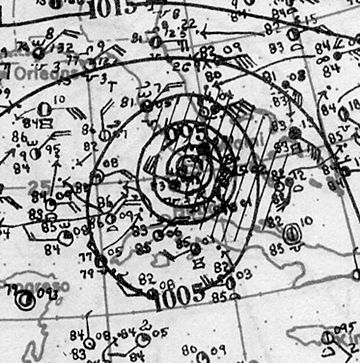1926 Miami hurricane facts for kids
| Category 4 major hurricane (SSHWS/NWS) | |

Surface weather analysis of the storm over South Florida on September 18
|
|
| Formed | 11 September 1926 |
|---|---|
| Dissipated | 22 September 1926 |
| Highest winds | 1-minute sustained: 150 mph (240 km/h) |
| Lowest pressure | 930 mbar (hPa); 27.46 inHg (estimated) |
| Fatalities | 372–539+ |
| Damage | $78.58 million (1926 USD) (Costliest U.S. hurricane when adjusted for wealth normalization) |
| Areas affected | Turks and Caicos Islands, The Bahamas, Florida, Alabama, Mississippi, Louisiana |
| Part of the 1926 Atlantic hurricane season | |
The 1926 Miami Hurricane, also called the Great Miami Hurricane, was a very big and strong tropical cyclone. This powerful storm caused a lot of damage in the Miami metropolitan area of southern Florida. It also hit The Bahamas very hard.
The hurricane caused about $78.5 million in damage in the United States at that time. If we think about how much money is worth today, experts in 2010 said the damage would be around $165 billion. This means it was even more expensive than Hurricane Katrina, making it the costliest U.S. hurricane ever when adjusted for wealth.
Sadly, between 372 and 540 people lost their lives because of this hurricane.
What is a Hurricane?
A hurricane is a huge, spinning storm that forms over warm ocean waters. It has strong winds and heavy rain. Hurricanes are also known as tropical cyclones. They get their energy from the warm water. When they move over land, they can cause a lot of destruction. This includes strong winds, heavy rainfall, and storm surges. A storm surge is when the ocean water rises above its normal level.
The Storm's Journey
The Great Miami Hurricane started forming on September 11, 1926. It grew stronger as it moved across the Atlantic Ocean. It first hit the Turks and Caicos Islands and The Bahamas. These islands felt the full power of the storm.
After that, the hurricane moved towards Florida. It made landfall near Miami on September 18. The storm then crossed Florida and went into the Gulf of Mexico. It continued to cause damage in states like Alabama, Mississippi, and Louisiana before finally fading away on September 22.
Damage and Impact
When the hurricane hit Miami, it brought winds of up to 130 miles per hour. The storm surge was also very high. It flooded many areas, especially along the coast. Buildings were destroyed, and trees were knocked down. Homes, businesses, and bridges were badly damaged.
Many people were left without homes. It took a long time for the areas to recover. The hurricane showed how important it is to be ready for big storms. It also led to better building codes in Florida. These rules help make buildings stronger against future hurricanes.
Images for kids
-
Damage to a home near Miami, Florida
-
Damage on Fort Lauderdale beach, near Port Everglades
-
Damage on Miami Beach
-
Damage to Knight's Chapel in Nokomis
-
Panoramic view of Downtown Miami after the hurricane, wryly titled "Miami's New Drydock"
 | Aurelia Browder |
 | Nannie Helen Burroughs |
 | Michelle Alexander |










